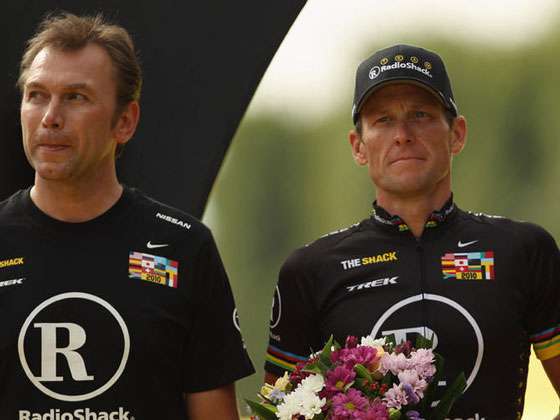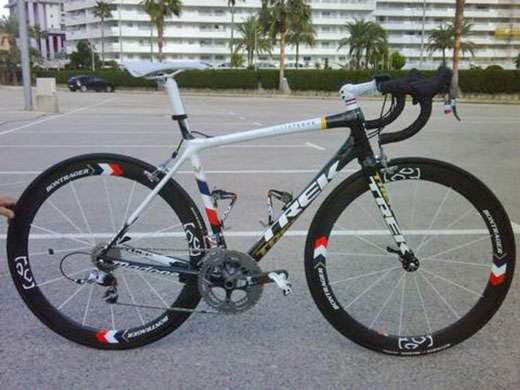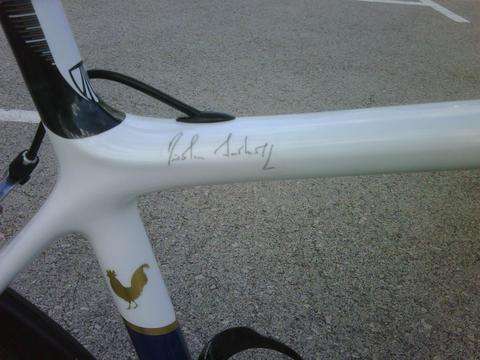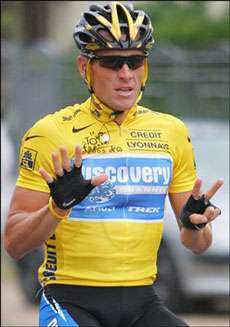
O ciclista americano Lance Armstrong destistiu de se defender no processo instaurado pela Agência Antidoping dos Estados Unidos (USADA) contra ele, no qual ele é acusado de usar EPO (Erythropoietina), esteróides e transfusões de sangue como doping para melhorar seu rendimento, entre 1999 e 2005.
Desta forma, Armstrong perderá seus sete títulos da Volta da França e será banido definitivamente do ciclismo, devido ao uso de substâncias proibidas. O ciclista tomou a decisão após um tribunal federal de Austin, Texas, negar seu recurso contra a USADA, abrindo caminho para que a agência prosseguisse com as investigações.
"Virei a página. Não vou insistir neste tema, apesar das circunstâncias. Chega um momento na vida de cada homem que você tem que dizer 'é o suficiente'. Para mim, este momento é agora. O custo disto está pesando sobre minha família e meu trabalho para nossa fundação e me leva a dizer: 'terminei com as bobagens'", disse Armstrong.
"É um dia triste para todos os que amam o esporte e para os nossos heróis esportivos. Este é um exemplo doloroso de como a cultura de vencer a todo custo nos esportes, se não for reprimida, superará a competição leal, segura e honesta. Para os atletas limpos, esta será uma lembrança reconfortante de que há esperança para as gerações futuras de competição em igualdade de condições sem o uso de substâncias proibidas", disse Travis Tygart, diretor-executivo da USADA, que informou à AFP que Lance Armstrong perderá todos os resultados que conquistou a partir de 1º de agosto de 1998.
Lance Armstrong iniciou sua longa história no esporte nas piscinas. Após a natação, iniciou-se no triatlo, onde venceu torneios nas categorias de base. Daí, foi para o ciclismo. Aos 21 anos, venceu o Mundial de Estrada.
Em 1996, no auge de sua carreira, aos 25 anos, anunciou que estava com câncer no testículo. Outros dois tumores também foram descobertos no pulmão e no cérebro. Na época, os médicos diziam que a probabilidade do americano sobreviver era de apenas 40%.
O atleta criou a "Fundação Lance Amstrong" para a luta contra o câncer e escreveu vários livros. Em 1998, após o tratamento, voltou a competir. No ano seguinte, já conquistou seu primeiro título da Volta da França. A partir de então, manteve a hegemonia na competição até 2005, somando sete troféus, quando anunciou o fim da carreira.
No entanto, voltou em 2006, quando disputou a Maratona de Nova York e, em 2008, decidiu retornar às competições internacionais, onde permaneceu até 2011. Os últimos anos da carreira do americano foram marcados por acusações de doping.
Em 2005, começaram as suspeitas de que ele teria usado substâncias proibidas em 1999. Urina congelada do ciclista passou por análise, já que, na época, não havia tecnologia suficiente para isso. O resultado apontou para o uso de Erythropoietina.
Defensores de Armstrong argumentavam que a substância não era proibida na época. Em 2006, ele foi considerado inocente. Entrentanto, novas acusações surgiram em 2011. Dois ex-colegas de equipe revelaram que Lance se dopava.
Em junho deste ano, a USADA acusou-o formalmente do consumo de substâncias ilícitas, baseando-se em amostras sanguíneas de 2009 e 2010, além dos testemunhos dos ex-colegas de equipe e de outros ciclistas.
O press release da USADA sobre a sua decisão pode ser conferido abaixo.
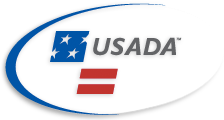 STATEMENT FROM USADA CEO TRAVIS T. TYGART REGARDING DISMISSAL OF ARMSTRONG LAWSUIT
STATEMENT FROM USADA CEO TRAVIS T. TYGART REGARDING DISMISSAL OF ARMSTRONG LAWSUIT
Colorado Springs, CO (August 20, 2012)
"We are pleased that the federal court in Austin, Texas has dismissed Lance Armstrong’s lawsuit and upheld the established rules which provide Congressionally-mandated due process for all athletes. The rules in place have protected the rights of athletes for over a decade in every case USADA has adjudicated and we look forward to a timely, public arbitration hearing in this case, should Mr. Armstrong choose, where the evidence can be presented, witness testimony will be given under oath and subject to cross examination, and an independent panel of arbitrators will determine the outcome of the case."
United States Anti-Doping Agency
Tel: 719.785.2000 • Fax: 719.785.2001 usada@usada.org • www.usada.org
CONTACT: Annie Skinner, Media Relations Manager Phone: (719) 785-2046
E-mail: askinner@usada.org
O pronunciamento oficial de Lance Armstrong em seu site pode ser conferido abaixo.
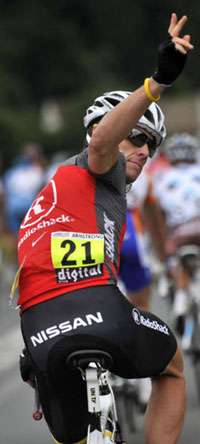 Lance Armstong's Statement of August 23, 2012
Lance Armstong's Statement of August 23, 2012
AUSTIN, Texas - August 23rd, 2012 - There comes a point in every man's life when he has to say, "Enough is enough." For me, that time is now. I have been dealing with claims that I cheated and had an unfair advantage in winning my seven Tours since 1999. Over the past three years, I have been subjected to a two-year federal criminal investigation followed by Travis Tygart's unconstitutional witch hunt. The toll this has taken on my family, and my work for our foundation and on me leads me to where I am today – finished with this nonsense.
I had hoped that a federal court would stop USADA’s charade. Although the court was sympathetic to my concerns and recognized the many improprieties and deficiencies in USADA’s motives, its conduct, and its process, the court ultimately decided that it could not intervene.
If I thought for one moment that by participating in USADA’s process, I could confront these allegations in a fair setting and – once and for all – put these charges to rest, I would jump at the chance. But I refuse to participate in a process that is so one-sided and unfair. Regardless of what Travis Tygart says, there is zero physical evidence to support his outlandish and heinous claims. The only physical evidence here is the hundreds of controls I have passed with flying colors. I made myself available around the clock and around the world. In-competition. Out of competition. Blood. Urine. Whatever they asked for I provided. What is the point of all this testing if, in the end, USADA will not stand by it?
From the beginning, however, this investigation has not been about learning the truth or cleaning up cycling, but about punishing me at all costs. I am a retired cyclist, yet USADA has lodged charges over 17 years old despite its own 8-year limitation. As respected organizations such as UCI and USA Cycling have made clear, USADA lacks jurisdiction even to bring these charges. The international bodies governing cycling have ordered USADA to stop, have given notice that no one should participate in USADA’s improper proceedings, and have made it clear the pronouncements by USADA that it has banned people for life or stripped them of their accomplishments are made without authority. And as many others, including USADA’s own arbitrators, have found, there is nothing even remotely fair about its process. USADA has broken the law, turned its back on its own rules, and stiff-armed those who have tried to persuade USADA to honor its obligations. At every turn, USADA has played the role of a bully, threatening everyone in its way and challenging the good faith of anyone who questions its motives or its methods, all at U.S. taxpayers’ expense. For the last two months, USADA has endlessly repeated the mantra that there should be a single set of rules, applicable to all, but they have arrogantly refused to practice what they preach. On top of all that, USADA has allegedly made deals with other riders that circumvent their own rules as long as they said I cheated. Many of those riders continue to race today.
The bottom line is I played by the rules that were put in place by the UCI, WADA and USADA when I raced. The idea that athletes can be convicted today without positive A and B samples, under the same rules and procedures that apply to athletes with positive tests, perverts the system and creates a process where any begrudged ex-teammate can open a USADA case out of spite or for personal gain or a cheating cyclist can cut a sweetheart deal for themselves. It’s an unfair approach, applied selectively, in opposition to all the rules. It’s just not right.
USADA cannot assert control of a professional international sport and attempt to strip my seven Tour de France titles. I know who won those seven Tours, my teammates know who won those seven Tours, and everyone I competed against knows who won those seven Tours. We all raced together. For three weeks over the same roads, the same mountains, and against all the weather and elements that we had to confront. There were no shortcuts, there was no special treatment. The same courses, the same rules. The toughest event in the world where the strongest man wins. Nobody can ever change that. Especially not Travis Tygart.
Today I turn the page. I will no longer address this issue, regardless of the circumstances. I will commit myself to the work I began before ever winning a single Tour de France title: serving people and families affected by cancer, especially those in underserved communities. This October, my Foundation will celebrate 15 years of service to cancer survivors and the milestone of raising nearly $500 million. We have a lot of work to do and I'm looking forward to an end to this pointless distraction. I have a responsibility to all those who have stepped forward to devote their time and energy to the cancer cause. I will not stop fighting for that mission. Going forward, I am going to devote myself to raising my five beautiful (and energetic) kids, fighting cancer, and attempting to be the fittest 40-year old on the planet.
To: Mr. William Bock, III, General Counsel United States Anti-Doping Agency
Dear Bill:
The United States Anti-Doping Agency ("USADA") has presented our client, Lance Armstrong, with the following ultimatum: Agree, by midnight on Thursday, August 23rd, to submit to an unauthorized, ultra vires disciplinary proceeding against him by USADA or accept USADA’s proposed sanction. Given the assertion of jurisdiction and authority by the Union Internationale Cycliste ("UCI"), and its mandate that no one associated with UCI or USA Cycling should participate in such an arbitration, which was confirmed by USA Cycling, Mr. Armstrong cannot proceed into the arbitration. For that reason and based on the reservations articulated by Judge Sparks, it would appear that the appropriate next step for USADA would be to: a) follow the governing rules and submit the information and evidence to UCI for an independent review and decision; or b) take the jurisdictional dispute (which puts Mr. Armstrong in the middle) to the appropriate forum to resolve the issue, the Court for Arbitration for Sport (CAS).
From the beginning, we have challenged USADA’s motives, methods, and authority to proceed with a so-called conspiracy charge against Mr. Armstrong and others. While the federal court concluded that it lacked jurisdiction to address these issues, its decision leaves no room for doubt that our concerns are well-founded. Indeed, the court’s observations make clear that Mr. Armstrong’s arguments that USADA lacks jurisdiction are compelling, and that USADA’s efforts to sanction Mr. Armstrong for alleged conduct dating back to before 1996, had "the smell of bad fish." The ethical implications for an inquisition based on hearsay from witnesses to whom USADA has promised leniency are questionable at best. As for the inclusion of foreigners who have never set foot on US soil, Judge Sparks detected a "stench". As the Court aptly put it, USADA’s conduct has been "motivated more by politics and a desire for media attention than faithful adherence to [USADA’s] obligations.
USADA has no authority to proceed in this matter for all of the reasons we have set out in our previous pleadings, correspondence and my presentation in Federal Court. After Mr. Armstrong filed his federal court action, UCI, the international federation for cycling, and USA Cycling, the national governing body for cycling in the United States, both confirmed that UCI, not USADA, has the exclusive authority and jurisdiction in this matter.
For reasons of its own, which Judge Sparks correctly characterized as suspicious and selfserving, USADA refuses to abide its own governing rules. Mr. Armstrong is not free to pick and choose the rules he must follow. Rather, as a retired international cyclist responding to charges about international events he competed in pursuant to his UCI international license, Mr. Armstrong must follow the rules and decisions of the UCI. Under all the applicable rules, USADA cannot proceed until it submits its evidence to UCI’s independent panel for review and adjudicates any disputes with that panel about jurisdiction, scope, the reliability of the evidence, and all related issues with UCI in CAS. At an absolute minimum, UCI and USADA should go to CAS to resolve the jurisdiction issue before any proceedings begin, a solution offered by UCI but rejected by USADA.
A USADA proceeding would force Mr. Armstrong to arbitrate about jurisdiction in at least two, and perhaps three, arbitrations – AAA and then CAS – and perhaps later in a Swiss court. Then, when even USADA’s unfair multi-stage process confirms that USADA does not have authority or jurisdiction, USADA would then be free to submit the file to UCI for consideration and referral and start what would be another review by CAS prior to any dispositive proceeding. It is fundamentally unfair to put Mr. Armstrong through that costly and time-consuming process, particularly when it is already clear that USADA does not have authority to bring these charges. Mr. Armstrong will, instead, respect the decision of UCI with every confidence that his position should and will be vindicated through independent review by authorities with lawful jurisdiction over this matter. As you are aware, this has been the exclusive and required procedure invoked for every international cyclist except Mr. Armstrong.
We believe UCI’s independent review panel would conclude, as any fair tribunal would, that the little evidence that exists is tainted testimony procured improperly from witnesses trying to profit at Mr. Armstrong’s expense and secured by improper coercion and promises to witnesses. It is also very likely that USADA’s blatant failure to observe its own 8-year statute of limitations by pursuing allegations over 17 years old would be summarily corrected.
In one of USADA’s many recent press releases, USADA’s CEO, Travis Tygart, stated that "Mr. Armstrong agreed to play by the same rules that apply to every other athlete and we believe he should not be allowed to create a new set of rules that apply only to him." But if USADA were sincere about its repeated admonitions, then USADA should follow the governing rules, under which UCI has exclusive authority for this matter.
Any organization that is serious about fair play, integrity, and respect for rules, would take Judge Sparks’ criticisms to heart, rather than waste taxpayer money in the vindictive pursuit of Mr. Armstrong. Sadly, based upon our experience with USADA over the recent months, we have little confidence that USADA has the institutional character for that task. Indeed, the Court further observed that "USADA’s apparent single-minded determination to force Armstrong to arbitrate’ indicated that USADA was "acting according to less noble motives" than to combat doping. To be clear: Mr. Armstrong is not requesting a AAA arbitration because -- unlike USADA – he respects the rules applicable to him and not because of any belief that USADA’s charges have merit or any fear of what a fair proceeding would establish.
Finally, you are on notice that if USADA makes any public statement claiming, without jurisdiction, to sanction Mr. Armstrong, or to falsely characterize Mr. Armstrong’s reasons for not requesting an arbitration as anything other than a recognition of UCI jurisdiction and authority, USADA and anyone involved in the making of the statement will be liable.
Very truly yours,
Timothy J. Herman
Robert Luskin

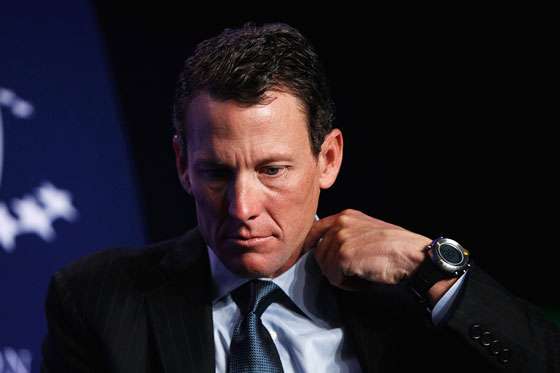
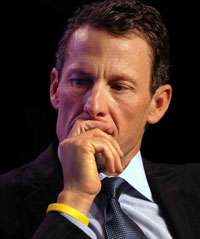 Ao contrário do que André Birotte, da United States Attorney, disse em conferência de imprensa na terça-feira, uma fonte do governo americano disse à ABC News que "agentes estão investigando Armstrong por obstrução, ameaças à testemunhas e intimidação", e que Lance está perto de sofrer um processo criminal.
Ao contrário do que André Birotte, da United States Attorney, disse em conferência de imprensa na terça-feira, uma fonte do governo americano disse à ABC News que "agentes estão investigando Armstrong por obstrução, ameaças à testemunhas e intimidação", e que Lance está perto de sofrer um processo criminal.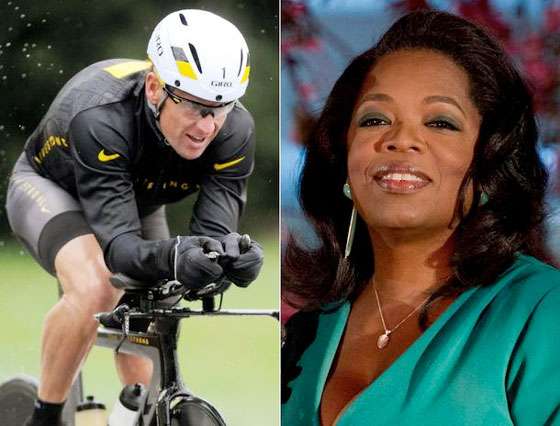
 Em uma conferência de imprensa, em Genebra, Suiça, após a ánalise do relatório feito pela Agência Americana de Antidoping (USADA), a União Ciclística Internacional (UCI) decidiu banir oficialmente Lance Armstrong do ciclismo, além de retirar do atleta os sete títulos da Volta da França.
Em uma conferência de imprensa, em Genebra, Suiça, após a ánalise do relatório feito pela Agência Americana de Antidoping (USADA), a União Ciclística Internacional (UCI) decidiu banir oficialmente Lance Armstrong do ciclismo, além de retirar do atleta os sete títulos da Volta da França. O ciclista americano Lance Armstrong destistiu de se defender no processo instaurado pela Agência Antidoping dos Estados Unidos (USADA) contra ele, no qual ele é acusado de usar EPO (Erythropoietina), esteróides e transfusões de sangue como doping para melhorar seu rendimento, entre 1999 e 2005.
O ciclista americano Lance Armstrong destistiu de se defender no processo instaurado pela Agência Antidoping dos Estados Unidos (USADA) contra ele, no qual ele é acusado de usar EPO (Erythropoietina), esteróides e transfusões de sangue como doping para melhorar seu rendimento, entre 1999 e 2005. STATEMENT FROM USADA CEO TRAVIS T. TYGART REGARDING DISMISSAL OF ARMSTRONG LAWSUIT
STATEMENT FROM USADA CEO TRAVIS T. TYGART REGARDING DISMISSAL OF ARMSTRONG LAWSUIT Lance Armstong's Statement of August 23, 2012
Lance Armstong's Statement of August 23, 2012 Lance Armstrong anunciou sua despedida do ciclismo profissional. Apesar de pedidos para que ele participasse do calendário estadunidense em 2011, o Santos Tour Down Under foi sua última competição.
Lance Armstrong anunciou sua despedida do ciclismo profissional. Apesar de pedidos para que ele participasse do calendário estadunidense em 2011, o Santos Tour Down Under foi sua última competição.